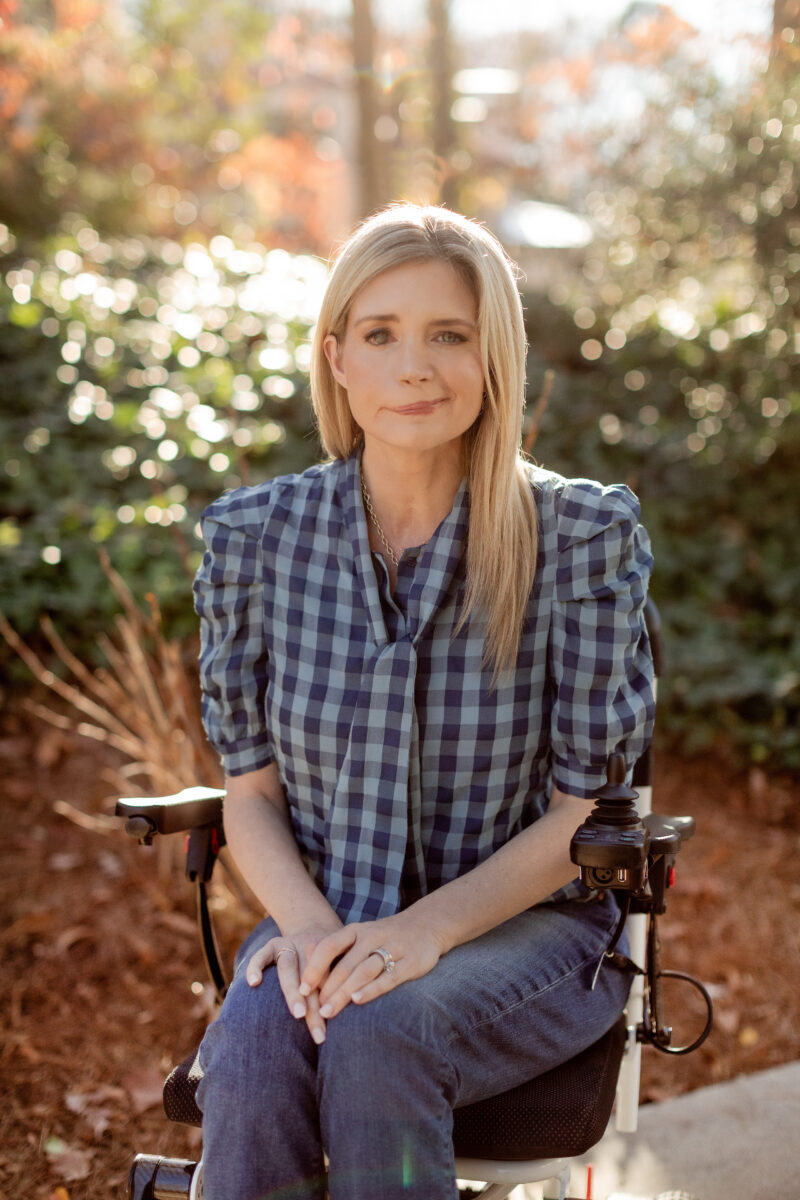
In 2008, Katherine Wolf suffered a massive stroke, a result of an arteriovenous malformation (AVM) rupture caused by a rare congenital defect Wolf didn’t know she had. When the rupture occurred, she collapsed on her kitchen floor while her six-month-old son slept in an adjacent room of her California home. Her husband, Jay, happened to stop between his law school classes to find her. She was rushed to UCLA Medical Center where she soon underwent a 16-hour rigorous surgery in which portions of her brain were removed. Wolf spent the next 40 days in an intensive care unit, a year in rehab, in which she was unable to eat, and underwent nearly a dozen more significant operations.
“I subsequently became severely disabled, as I largely remain today,” Katherine said. “I was thrust into the world and saw things from a different perspective.”
Katherine’s massive stroke drastically altered her day-to-day life and abilities. She doesn’t mince words when stating that life with disabilities can be “extremely painful,” particularly for people with acquired disabilities. Still, there are lessons to be learned from the experience, and Wolf and her husband have made it their mission to underscore that pain is not the end of one’s story, but the beginning of a new one.
With this credo, Katherine has penned several books, serves as a public speaker, and began a podcast. In 2017, she and Jay began an inclusive camp for people with disabilities and their families. The couple are also founders of the nonprofit Hope Heals.
“There are great gifts we can give each other in our suffering,” she said. “What can I do with this? How can I help other people shift their dreams [and] learn new dreams? How can I be a part of uplifting someone else? I heard a quote recently that I love, which is to build a bigger table, not a taller fence. That’s what I want to do with my life.”
Wolf’s latest table, both literal and figurative, can be found at Mend Coffee & Goods located in the Tuxedo Festival development at 3655 Roswell Road.
Mend, which opened in April, was founded on the idea of creating a community hub that was accessible to all. The business features extensive considerations to accommodate those with disabilities, including adult changing stations in the bathrooms, tables that swivel to meet the height of wheelchair users, and more. The staff includes workers with disabilities.
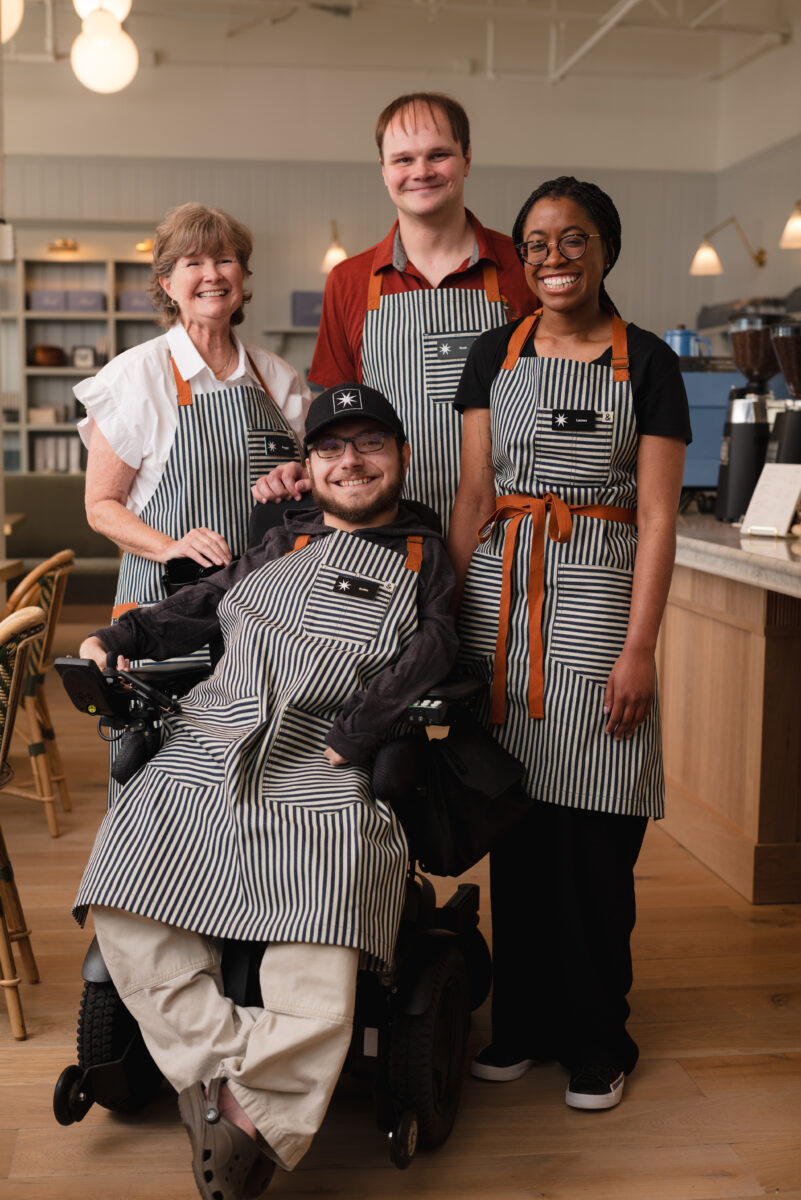
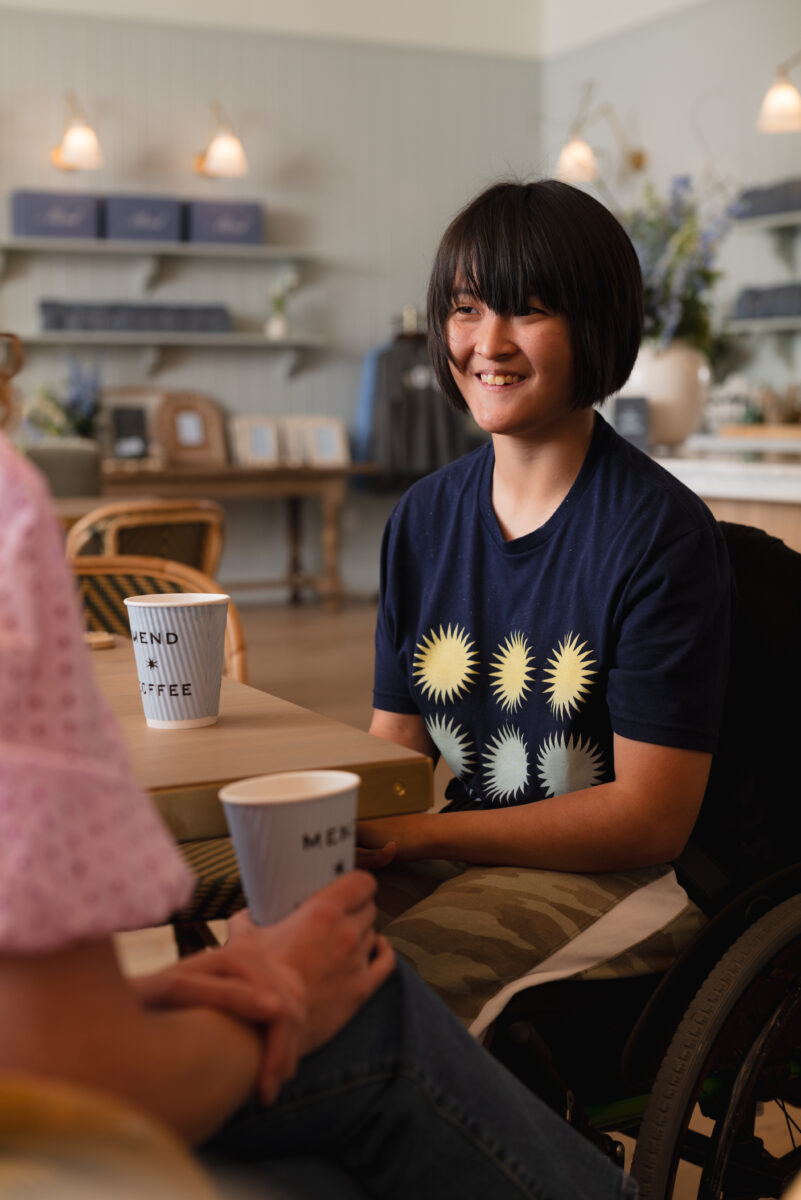


“The reality is people with disabilities are there, but often they stay inside and are not out in the world,” Katherine said. “These folks do not drive. They do not easily get in and out of buildings because they are using wheelchairs or other adaptive devices and [they are] trying to use them in a non-integrated world, because the world is not integrated for people with disabilities.”
Jay added this can make people with disabilities feel an indignity and that they are onlookers to life. It’s exacerbated by a feeling that gatherings or spaces for those with disabilities must be “in a separate room.”
“They see their lives turn upside down, but we want them to see they still have a place that wants to invite them in,” he said. “And not just with sterility, but with warmth. Gathering around a table is seen as so ordinary, but it really has the power to heal relationships, lift us up, and nourish us in emotional and spiritual ways. Anecdotally, you’ll have moms come out of (Mend’s) bathroom, which has motorization and tons of room, and say they’ve never felt so welcome — that a place would rise up to meet me and my challenges. They can take their loved one into the world and not have an issue doing something they like.”
Katherine said the Shepherd Center uses Mend for recreational therapy as the space is “extremely friendly” to those with disabilities and their families who need and desire a gathering place that accommodates their needs.
“It gives me a sense of pride to bring it to fruition,” Katherine said.
Mend also uses a “competitive integrated employment” model, which includes workers with disabilities.
“We really wondered if there were enough people who were able to work, who weren’t currently employed, and enough people right around Buckhead,” Katherine said. “The answer was a resounding ‘Yes.’
According to the U.S. Department of Labor, competitive integrated employment allows those with disabilities to be compensated at wage comparable to those without disabilities while receiving the same benefits and opportunities for advancement.
Within this strategy is the ability to let employees with disabilities be unsuccessful. Jay said it’s counterintuitive that many people with disabilities are not given the chance to fail as these experiences provide valuable learning opportunities.

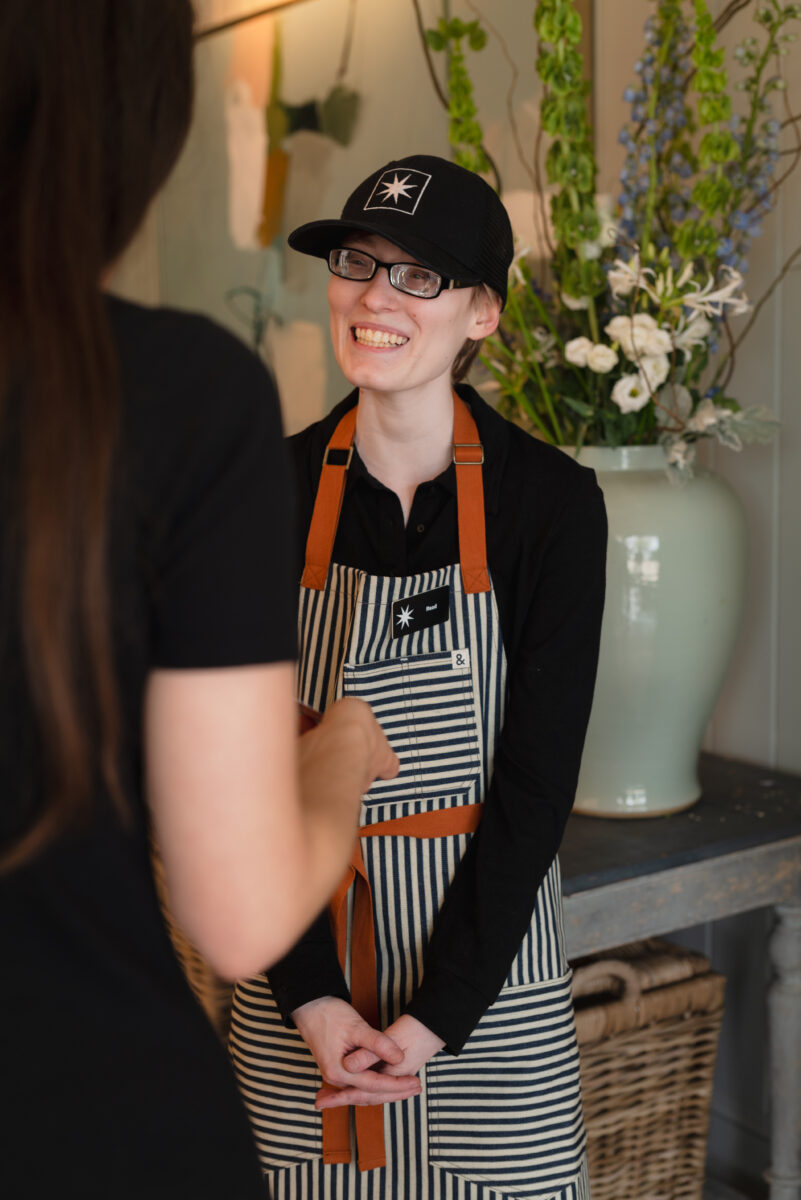
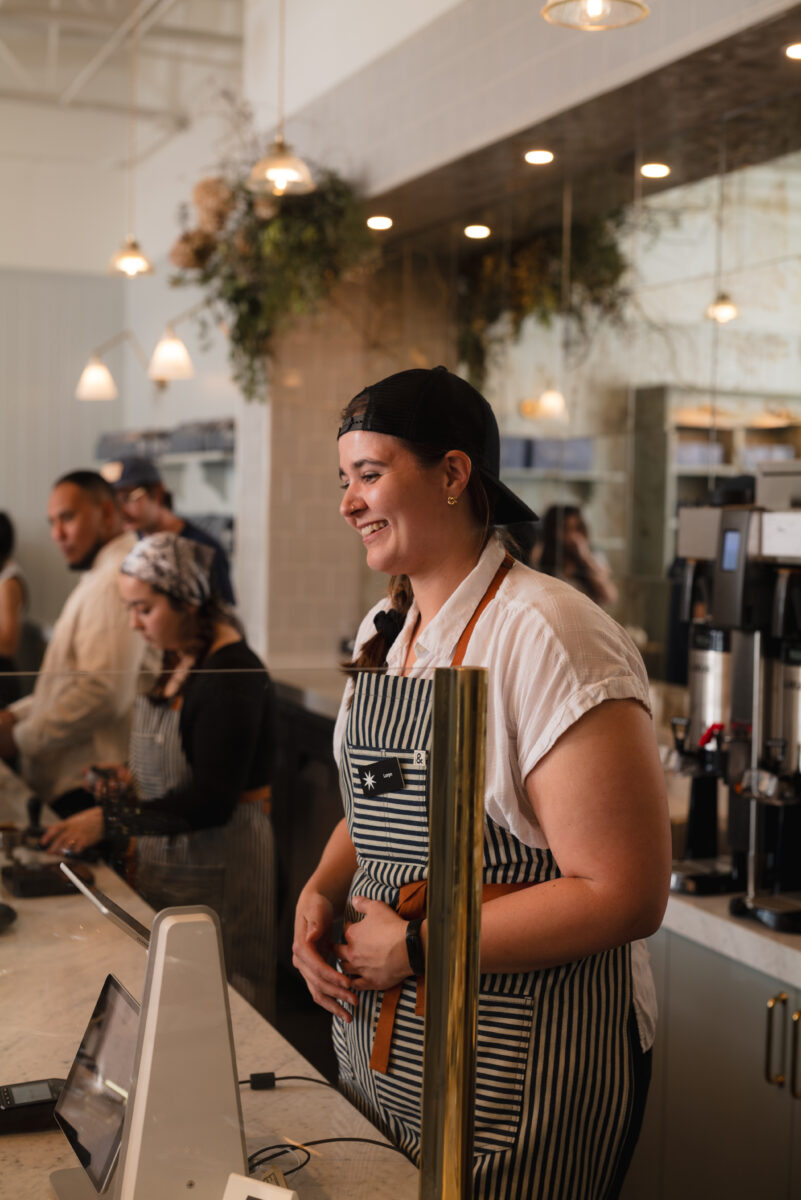

“It’s been really cool and challenging to find the right framework, and we’ve already had success teeing up the community and team running Mend,” he said.
Mend’s employment model does not allow for a lower quality of service, however.
“If you put an umbrella like disability or nonprofit over a business, it has to hold itself to a higher standard because there is a belief it will be of lower quality,” Jay said.
That emphasis is furthered by Mend being in Buckhead, which the family — which also includes the Wolf’s “miracle baby,” John, born in 2015 — has called home since 2018.
“The community has been so delighted to have a new place to gather and to have a place on the same par with its excellent hospitality establishments,” Jay said. “It shows the story of disability can have a beauty of depth and excellence to it.”
Though Buckhead is an affluent community, Jay adds, all have struggles on what they think they can do. These are still wheelchairs, Katherine believes, even if only in a person’s consciousness. As such, the Wolfs believe Mend provides a way for people with all abilities to have a seat at the table and “find our purpose together.”
Jay and Katherine spoke to The Buckhead Paper during the annual Hope Heals Camp they founded in 2017. The faith-focused, intergenerational camp is designed for those of all ages and abilities and their families. The camp touts it has supported 2,000 participants from 35 states with 40 diagnoses represented.
Additionally, Katherine has penned three books. Her first, “Hope Heals,” was co-written by Jay and is a memoir of their life story. Katherine described her second book, “Suffer Strong,” as “lessons learned from the stroke, and about how to redefine everything we understand in our lives to cope with our realities.” In the same week Mend opened, Katherine published “Treasures in the Dark,” which she calls a meditation guide and how to find bright hope hidden in heartache.
Katherine said she is continually inspired to tell her story and help others.
“I am super motivated by my faith and my tremendous community of friends and family,” she said. “I have felt extremely uplifted by the resourcing available to me through those things, and there is such a responsibility when you are given them. If you have any advantage in the world, I believe you must pour it out for others.”
The future has been in question this year for one of Buckhead’s most historically rich sites, the Paces Ferry United Methodist Church and adjacent Pleasant Hill Cemetery. Paces Ferry UMC, founded in 1877, shuttered its doors permanently in March and was subsequently sold. The cemetery, which predates the church building, was not included in the sale, but its operational status was left in question.
However, a group of residents recently formed a nonprofit organization to preserve Pleasant Hill Cemetery. Now with the property’s deed in hand, they are looking to its future.
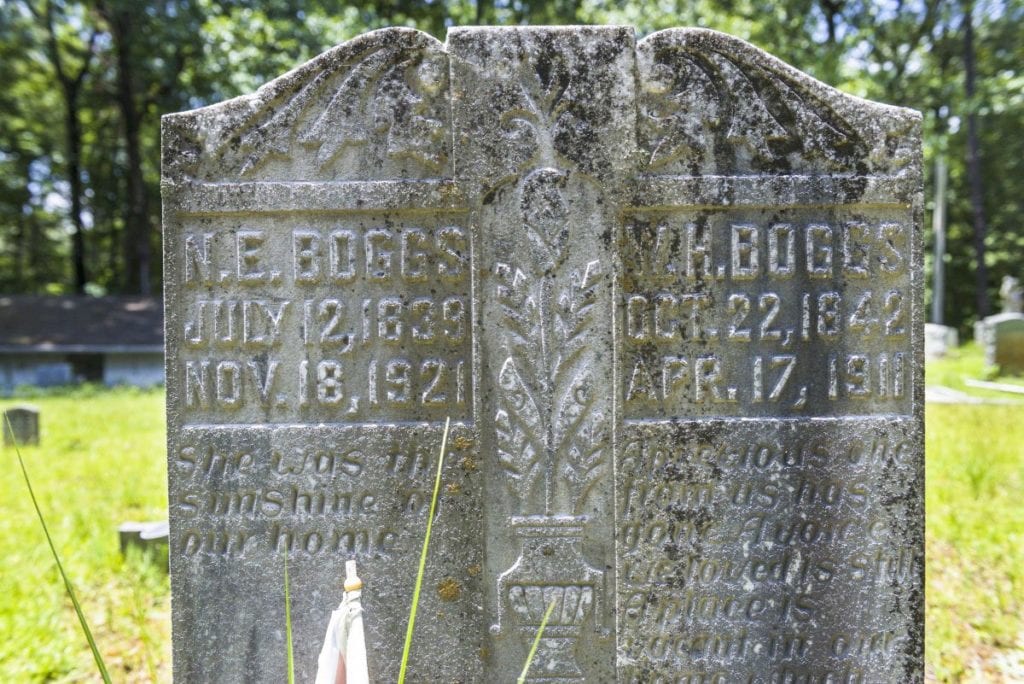
Hank Koppelman, who served for nearly 15 years on the Paces Ferry UMC’s board, helped spearhead the creation of the 501c13 nonprofit — Pleasant Hill Cemetery Association at Paces Ferry, Inc. — which will operate the historic cemetery. The association recently received the cemetery’s deed from the North Georgia Conference of the United Methodist Church, allowing the group to “get to work.”
The association has set out with two major initiatives — improve the cemetery and connect with the living descendants of those buried there.
“There are a lot of people buried in the cemetery we think are related to people who are still alive,” Koppelman said. “Some gravesites have flowers on them on a regular basis, but we have no way of contacting these people. With our new association, we are looking for families to join us as volunteers, maybe even contributors.”
Koppelman said the cemetery association is planning on mailing letters to the believed descendants, but not all these addresses are verified. The association hopes more families will reach out to the newly formed group to connect the past with the present and improve the site.
Those who have family members buried at the site, or who want to volunteer with the association, can use the association’s new website, PleasantHillPacesCemetery.com. Physical mail can also be sent to the cemetery at 3612 Paces Ferry Road, Atlanta, Georgia, 30327.
“There’s a lot of history in that little cemetery, and we’d like to get out the word more,” Koppelman said. “We’ve had a number of tours of the church and cemetery, and every year we do a Wreaths Across America event placing wreaths on gravesites. There’s lots of activities, but there are also a number of things we need, like signage and to clean up some of the gravesites. There’s a lot of manual labor that needs to be involved.”
Koppelman and the association are hoping these plans will help preserve the historic site for future generations.
“When the church closed, there were a number of us who were members of the church who wanted to continue working with the cemetery,” he said. “I think a number of us are relieved to get the deed. It took a while to get through the hierarchy of the North Georgia Conference. We have an active board, and we are anxious to get to work.”
Among the believed 181 gravesites are 11 veterans dating from the Civil War to the Vietnam War. Among them is William Brown, a Confederate soldier who donated the land for the cemetery and Paces Ferry UMC. In 2020, the cemetery was professionally studied with 19 potential unmarked gravesites identified. Those unmarked graves are now marked with wood slabs.
The cemetery’s new operating group has started its next steps as the adjacent historic church looks to its next era under new ownership.
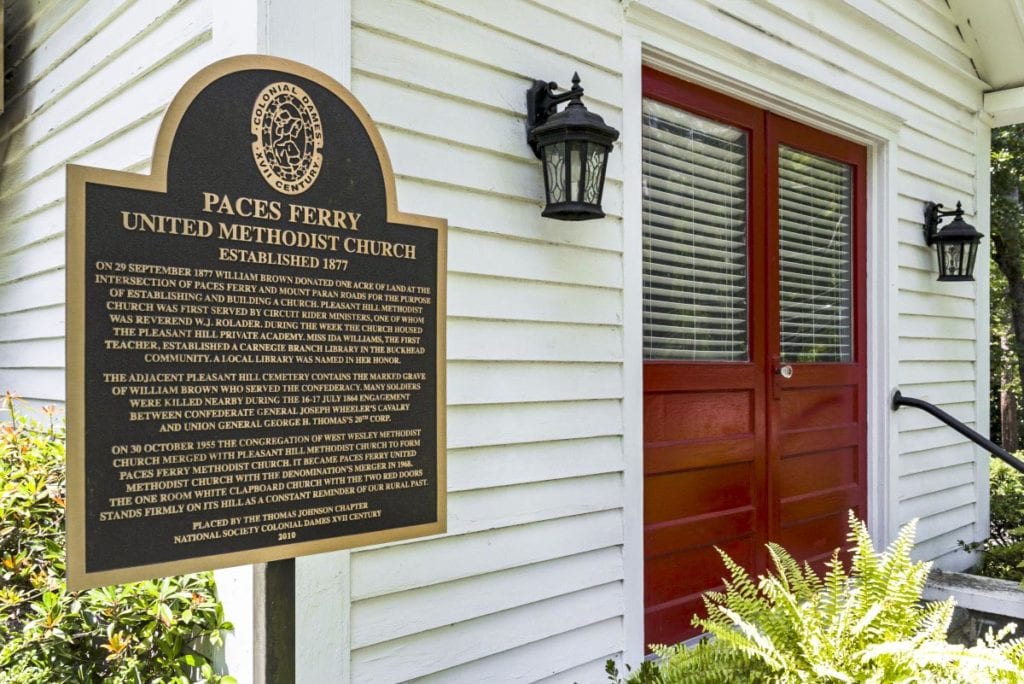
Citing low attendance, Paces Ferry UMC held its last service in March, ending more than a century of it serving as a gathering place and spiritual home for those in Buckhead. While services have ended indefinitely, the church and fellowship hall could soon again serve as a community hub.
A group of investors purchased the church and fellowship hall property earlier this summer. The group plans to honor William Brown’s original intent when he donated the site in the late 19th century to “promote [Christ’s] heritage on Earth.” Additionally, the group said it will repair the church while retaining its original character.
The church’s new ownership group has floated the possibility of using the historic building to host Bible studies and as a potential hub for student ministries.